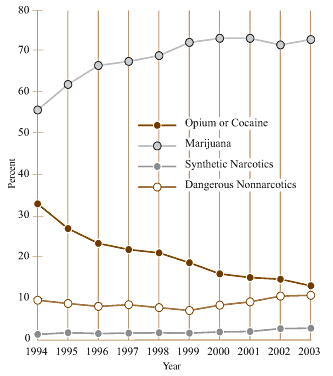The FBI released its annual Uniform Crime Report Monday, and it showed that despite nearly two decades of drug reform efforts, the drug war continues unabated, at least when measured by arrests. According to the report, overall drug arrests hit a record 1.8 million last year, accounting for 13.1% of all arrests in the country. Marijuana arrests totaled 786,545, another all-time high.

People arrested for drug dealing, manufacture, or cultivation accounted for only 18% of all drug arrests, meaning nearly 1.5 million people were subjected to the tender mercies of the criminal justice system merely because they possessed the wrong substance. When it comes to marijuana arrests, only 12% were for sale or cultivation, meaning some 696,000 people were busted for pot possession.
Marijuana arrests made up 42.6% of all drug arrests, suggesting that if the weed were legal, the drug war would shrink by roughly half. Heroin and cocaine accounted for another 30.2% of drug arrests, while synthetic and "other dangerous non-narcotic drugs" accounted for 27.2%
Marijuana arrests have more than doubled since 1993, when they sat at 380,000. By the beginning of the Bush administration in 2001, the number was 723,000. The figure declined to 697,000 in 2002, but has increased each year since then.
"These numbers belie the myth that police do not target and arrest minor marijuana offenders," said National Organization for the Reform of Marijuana Laws (NORML) executive director Allen St. Pierre, who noted that at current rates, a marijuana smoker is arrested every 40 seconds in America. "This effort is a tremendous waste of criminal justice resources that diverts law enforcement personnel away from focusing on serious and violent crime, including the war on terrorism," he argued.
"One marijuana arrest every 40 seconds," sighed Tom Angell, communications director for Students for Sensible Drug Policy (SSDP). "I think the numbers show that most people arrested for marijuana possession are young people, and presumably many of them are students. The more young people arrested for marijuana offenses, the more get convicted and lose their financial aid," he told Drug War Chronicle. "The consequences of a drug arrest don't end with handcuffs and jail cells; it's important to remember that when these numbers come out every year. Even if people aren't being sent to jail for long periods, they still suffer a great deal by losing access to public benefits and having criminal records that will haunt them for the rest of their lives."
"This is an interesting puzzle," said Bruce Mirken, communications director for the Marijuana Policy Project. "We hear all the time that police aren't making marijuana a priority, and yet the numbers keep going up. One might begin to think that some of these law enforcement people making these claims may not be telling the truth," he told the Chronicle.

"Arresting hundreds of thousands of Americans who smoke marijuana responsibly needlessly destroys the lives of otherwise law abiding citizens," St. Pierre said, adding that over 8 million Americans have been arrested on marijuana charges in the past decade. During this same time, arrests for cocaine and heroin have declined sharply, implying that increased enforcement of marijuana laws is being achieved at the expense of enforcing laws against the possession and trafficking of more dangerous drugs.
"Enforcing marijuana prohibition costs taxpayers between $10 billion and $12 billion annually and has led to the arrest of nearly 18 million Americans," St. Pierre concluded. "Nevertheless, some 94 million Americans acknowledge having used marijuana during their lives. It makes no sense to continue to treat nearly half of all Americans as criminals for their use of a substance that poses no greater -- and arguably far fewer -- health risks than alcohol or tobacco. A better and more sensible solution would be to tax and regulate cannabis in a manner similar to alcohol and tobacco."
"These sorts of numbers show the challenges the drug reform movement continues to face," said Bill Piper, director of national affairs for the Drug Policy Alliance. "Compared to 20 or 30 years ago, we're doing a good job of keeping people out of jail. Most people arrested on drug charges, at least for possession, probably get probation, and that's important," he told the Chronicle. "That said, the challenge for us is to deconstruct the institutions that support this. While most arrests are at the state and local level, the funding that the federal government provides to law enforcement is all tied to arrests, so state and local police forces have a very strong incentive to keep arresting drug offenders."
This work by StoptheDrugWar.org is licensed under Creative Commons Attribution-ShareAlike 4.0 International
Comments
Marijuana and the Law
Original Marijuana Law was inacted to keep the Mexicans from coming into California and picking fruit and vegetables cheaper than the citizen workers. Marijuana was the "drug of choice" by the Mexicans so the Attorney General at that time, during the "Great Depression" of the '20s and'30s decided to make marijuana illegal, arrest the Mexicans, and stop their infiltration into the U.S. It may have been a deterrant but that is where, according to my resources, the law originated.
The movie industry thought that the law was totally absurd and made a movie to spoof the law. I suspect most people are familiar with the movie makining fun of such a dumb law, as they saw it. The movie was entitled "Reefer Madness."
The law was not enforced to any significant degree until the "Hippies" started protesting the Viet Nam War. Since pot was a favorite of the Hippies, the enforcement of the law was increased. Now, since it and other drugs have built such a huge money mover out of the criminal justice system, they can't get it stopped. It represents too many jobs and too much revenue as a part of our country's Gross Domestic Product.
Is marijuana addictive? I don't know of enough valid scientific studies to show that it is. I suppose that one could develop a temporary dependency on it but eventually they are likely to be correctly diagnosed as having an anxiety disorder and prescribed an appropriate tranquilizer.
In reality, ethyl alcohol is the most dangerous chemical available as a mood altering agent. It makes a lot of money for the legitimate producers and sellers while at the same time producing a lot of jobs and revenue for the criminal justice system. In comparison, the current drug laws are a joke.
Bottom line, it's all about the three evils, Money, Power and Greed.
In reply to Marijuana and the Law by Anonymous (not verified)
Der Law
You forgot the competition that legal marijuana would pose on the alcohol, tobacco and the pharmaceutical companies. Those entities cannot allow legal pot! Lord...it might cut into profits!!!
And think of the loss of income for the legal profession...from judges all the way down to jailers...not to mention lawyers...YOUR tax money at work to save the society from itself. Sounds unconstitutional to me...after all...it's my freakin body!!
Reefer Madness was no spoof
Nuff said
What can we really do?
I would really like to know what we as a country can do to ammend drug laws (more specifically marijuana). Any intelligent person will tell you that marijuana is no more harmful than tobacco or alcohol, yet the latter two continue to be legal. Why? Because they pay congress-- people say that donating to NORML or other groups will get something done, but the fact remains that the people in power who make laws, are under the influence of alcohol, tobacco, and pharmeceutical companies-- and by that, I mean these industries donate BILLIONS of dollars per year to the government. Until people can find a way to donate the same amount of money (if not more) to the government, decriminalization of marijuana is not in our country's future. It is incredibly sad that alcohol and tobacco together kill over 1 million Americans every year, yet continue to be legal-- yet a harmless plant that has never been shown to kill anyone when used responsibly, is illegal. I for one, am sick and tired of hearing about my family and friends getting arrested because they had a roach in the ashtray, or a gram of some pot...how do we get our leaders to understand that it is not a dangerous substance, and that they can focus their efforts elsewhere like the 'oh-so-important' war on terror? For how great our country is, our government really has no idea what freedom, democracy, and social responsibility actually mean.....
me!!!
you neeed to give me some smoke!!lololol
you gay!!!
Add new comment